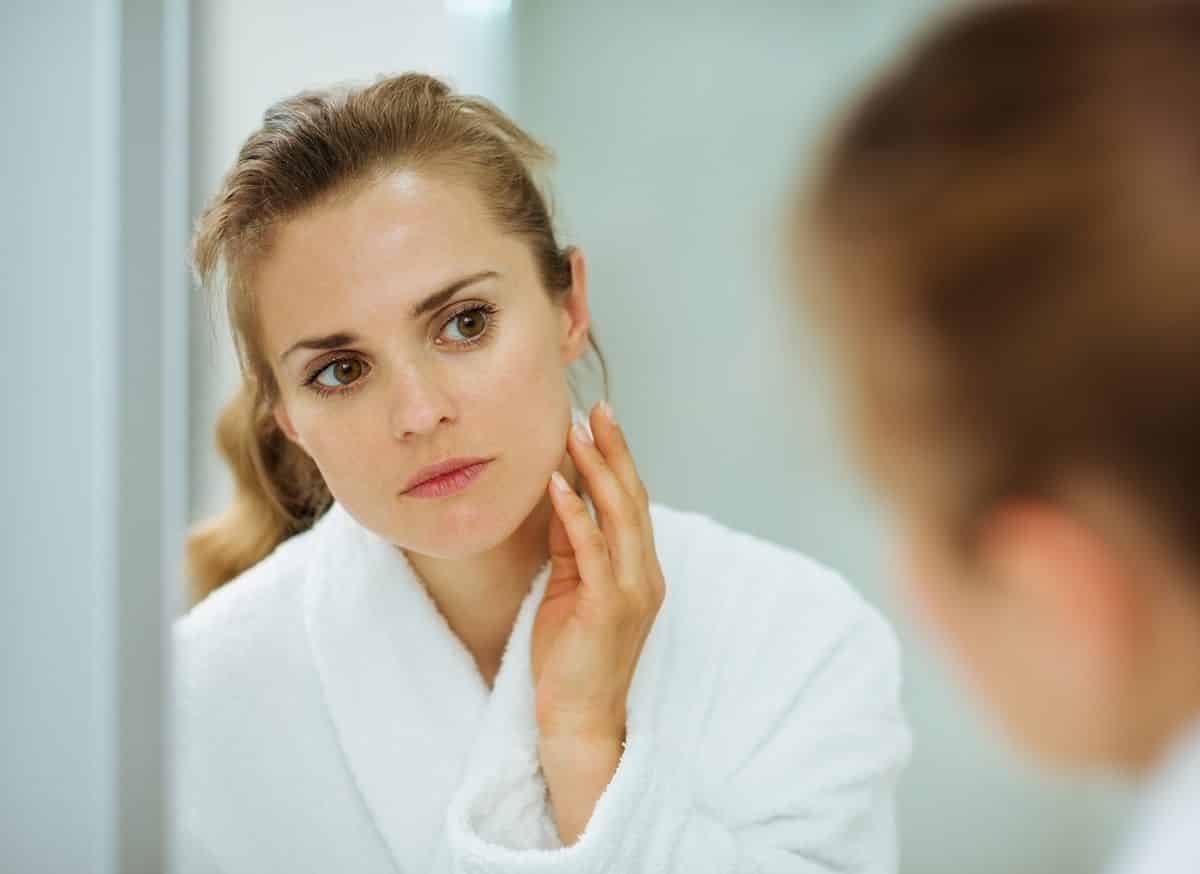Sleep Deprivation and Skin Health
You’ve likely heard many times over that you should aim for seven to nine hours of quality sleep per night. Sleep is vital to our health and well-being. Without enough sleep, we can suffer short-term consequences like lowered immune response and brain fog, and long-term consequences including an increased likelihood of many diseases, such as diabetes and obesity.
But did you know that sleep deprivation also impacts your skin health? Read on to learn more about what sleep deprivation does to your skin and the steps you can take to get better sleep.
What is Sleep Deprivation
Sleep deprivation is a condition defined by insufficient or poor-quality sleep. While a person can experience some symptoms of sleep deprivation after only one night of poor sleep, health consequences increase with chronic sleep deprivation.
The Centers for Disease Control and Prevention in the United States recommend that adults get seven or more hours of sleep per night, and Johns Hopkins Medicine suggests seven to nine hours. If you regularly sleep less than seven hours per night, you are sleep-deprived.
Importance of Sleep for Overall Health and Well-being
Sleep plays a vital role in our overall health and well-being. During sleep, our bodies undergo regenerative processes, consolidate memories and regulate hormones. Furthermore, without enough sleep, the body experiences immune system dysregulation. Over time, sleep deprivation impacts many bodily systems.
How Does Sleep Affect Our Skin?
Our skin is our largest organ. As the barrier that protects us from the outside world, our skin must be healthy and robust to protect against external aggressors. Sleep and skin health go hand in hand.
Unlike our other (internal) organs, our skin demonstrates its health in its appearance. Therefore, sleep not only impacts our skin’s health but also how it looks.
Increased Signs of Aging
When the skin cannot properly repair and regenerate, it will demonstrate signs of premature aging. Because the body releases human growth hormone during deep sleep, which helps repair damaged skin cells, lack of sleep can increase visible signs of aging. This can take the form of:
- Fine lines and wrinkles
- Sagging and drooping skin
- Blotchiness
- Uneven pigmentation
- Dryness
A 2020 Korean study of 32 women in their 40s found that “skin gloss, desquamation, transparency, elasticity and wrinkles were significantly aggravated after one day of sleep deprivation.” Its authors noted that “skin texture was significantly aggravated on the fourth day of sleep restriction” and that “elasticity was most affected by reduced sleep.”
Weakened Skin Barrier
Sleep deprivation also weakens your skin barrier, making the skin more susceptible to damage from external sources. This can cause increased sensitivity, dryness and inflammation, and can exacerbate skin conditions such as eczema and psoriasis.
A 2014 study investigated this phenomenon in women who were either poor or good sleepers (averaging less than five hours or seven to nine hours of sleep per night, respectively). After temporarily damaging the barrier by taping the skin, “good sleepers had 30% greater barrier recovery compared with poor sleepers.” Importantly, this study also demonstrated better recovery from sunburn in good sleepers when compared to poor sleepers.
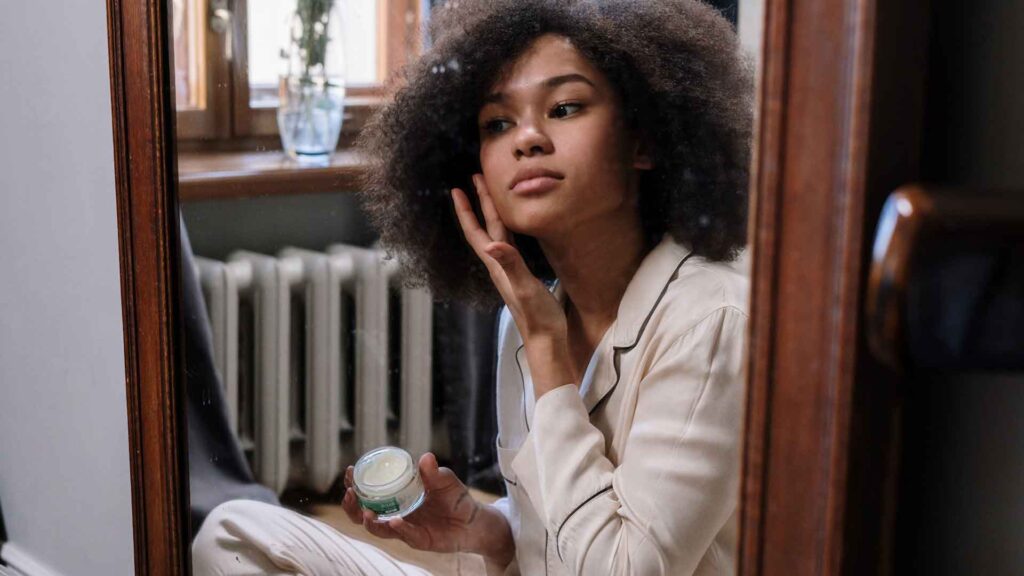
Poor Complexion and Dullness
During deep sleep, blood flow to the skin increases, bringing with it oxygen and vital nutrients. Reductions in deep sleep due to sleep deprivation can cause the skin to lose radiance, appearing dull and even grayish.
In addition, we naturally perspire while we sleep, and our sweat moisturizes the skin. The dewy glow created by this moisturization diminishes with decreased time asleep. Lack of sleep also lowers skin pH levels, leading to dry skin.
Increased Risk of Acne and Breakouts
Hormonal imbalance results from sleep deprivation. These imbalances can lead to the overproduction of sebum, an oil in our skin that can cause breakouts when overproduced or combined with clogged pores.
What Happens to Skin If You Don’t Get Enough Sleep?
Various physiological changes occur in the skin when you don’t get adequate sleep.
Hormonal Imbalance
A key impact of sleep deprivation is hormonal imbalance. The hormonal systems in our bodies are complex, and something as simple as sleeping too little can throw off the production of numerous hormones.
Lack of sleep disrupts the proper production of hormones including cortisol, insulin and melatonin. These imbalances can lead to many skin problems and inflammation.
Increased Cortisol Levels
Sleep deprivation leads to increased levels of cortisol, the stress hormone. Prolonged high cortisol levels negatively impact both your physical and mental health.
When it comes to the skin, increased cortisol can cause inflammation and lead to dryness, acne and premature skin aging. Because cortisol levels drop during REM sleep, getting enough REM sleep is crucial to keeping cortisol in check.
Disrupted Melatonin Production
Not getting enough sleep can also disrupt melatonin production. In addition to letting our bodies know when it’s time to fall asleep, melatonin is an important antioxidant that protects the body against free radicals and oxidative stress.
Decreased melatonin can diminish the body’s ability to fight skin infections and heal wounds. Additionally, because melatonin plays a role in the production and distribution of melanin, reduced melatonin levels can cause skin pigmentation issues, such as dark or light patches.
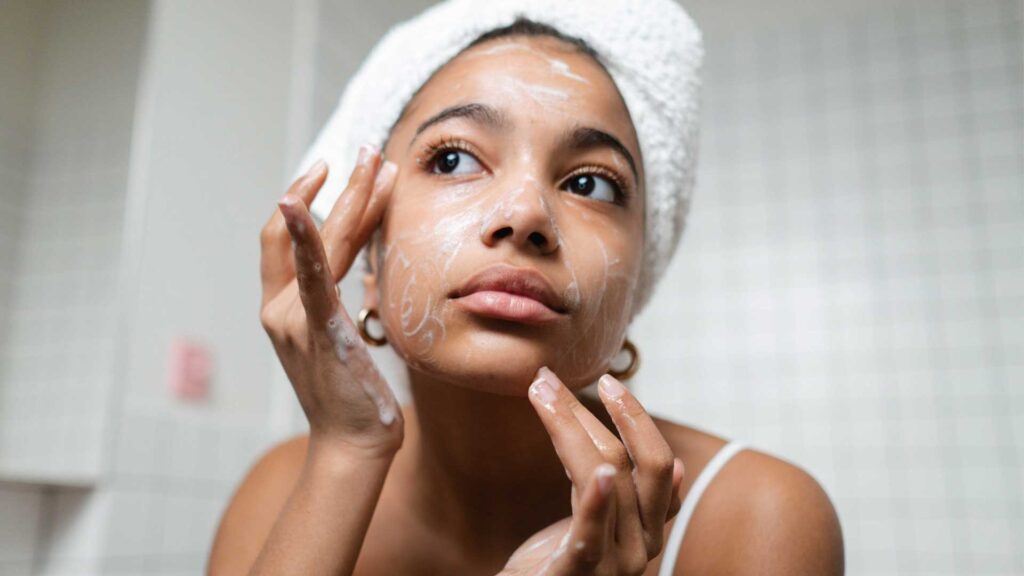
Reduced Blood Flow and Oxygenation
Vasodilation and skin vascularization are poorer in sleep-deprived individuals, which hinders nutrient delivery to skin tissues. Decreased blood flow in the skin can also make the skin appear pale.
Results of poor blood flow and oxygenation include:
- Inflammation
- Poor wound healing
- Dullness
- Blotchy skin
According to a 2017 study out of Sweden, in which participants were photographed before and after two days of sleep deprivation and then rated on visual criteria, “with a lack of sleep, blood flow to the skin is reduced, and according to raters faces look more pale after not sleeping.”
Impaired Collagen Production and Repair
Collagen provides support and structure to the skin and is responsible for skin elasticity. Too little sleep leads to decreased collagen production. Because this protein is so essential for the skin’s integrity, this can cause skin problems, including:
- Loss of skin elasticity, resulting in sagging skin
- Less plump skin, increasing the appearance of fine lines and wrinkles
- Loss of firmness
- Dry, dull skin
- Poor wound healing
- Thin, fragile skin
Altered Immune Function
Getting enough sleep is crucial to proper immune function. While this matters for your entire body, it also has impacts on your skin, including slower wound healing and increased susceptibility to infections. Immune function also supports collagen production.
Tips for Improving Sleep and Promoting Healthy Skin
Unfortunately, there is no shortcut to solving the skin problems that sleep deprivation causes. The only solution is getting more sleep. Fortunately, we have plenty of tried-and-true tips for how to do exactly that.
Establish a Consistent Sleep Schedule
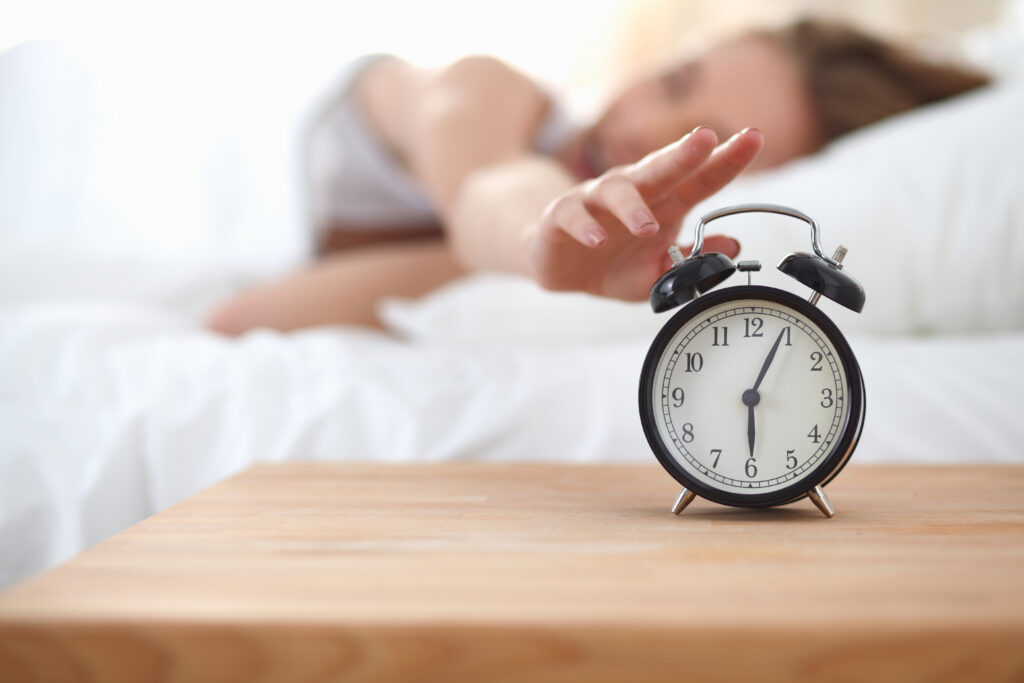
This may be the most challenging step for some people, but it is also very important. Establishing a consistent sleep schedule helps you reset your circadian rhythm so that you will eventually feel tired at bedtime and be ready to wake up in the morning.
Your new sleep schedule also applies on the weekends. To set your body up for success, you must forgo those extra few hours on weekend mornings. It is tough in the short term, but falling asleep and waking up at the same time every day is critical to getting enough quality sleep on a consistent basis.
Create a Sleep-friendly Environment
Setting the proper tone for sleep is also important, and creating a calm environment where you can get restful sleep can go a long way.
For a soothing sleep environment:
- Make it dark: Do whatever you can to make the room as dark as possible. This can include using blackout curtains, covering up lights on electronics and using a sleep mask, if necessary.
- Cool it down: Temperature impacts sleep quality. Try to keep your bedroom around 65 degrees Fahrenheit, or 70 degrees for babies and toddlers.
- Keep it quiet: Eliminate distracting sounds by wearing earplugs or using a white noise machine.
Check out our article on sleep environment for more tips.
Comfortable Mattress and Bedding
You can set up an ideal sleep environment, but if your mattress and bedding aren’t comfortable, you may still find yourself tossing and turning. Find a mattress that fits your specific needs and also keeps your body well-aligned throughout the night. Most people prefer a medium-firm mattress, but what makes the most comfortable mattress differs from person to person.
As for bedding, ensure you have high-quality sheets that keep you cool. Generally speaking, a higher thread count is more comfortable, but a lower thread count is more breathable, so it’s often best to settle somewhere in the middle.
Practice Good Sleep Hygiene
Sleep hygiene refers to practices you can implement to set yourself up for restful sleep. To help yourself fall and stay asleep, try to practice good sleep hygiene every night. While we cover many sleep hygiene tips in this article, you can check out our article on the topic for a deeper dive.
Avoid Electronic Devices before Bed
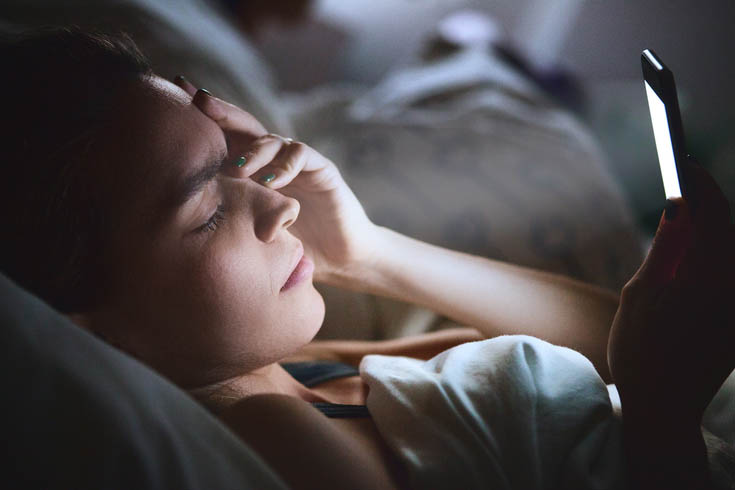
Research indicates that the blue light emitted by electronic devices such as cell phones and laptop computers can interfere with quality sleep. This makes sense, given that 25% of sunlight consists of blue light. Using electronic devices before bed inhibits the secretion of melatonin, which regulates the sleep-wake cycle.
In general, it is best to avoid screens for two to three hours before bedtime. However, if you cannot reasonably do that, at least try to steer clear for 30 minutes before you sleep. You can also choose nighttime settings on most devices to minimize blue light exposure after sunset.
Limit Caffeine and Alcohol Intake
Try to limit both caffeine and alcohol intake in the afternoon and evening in order to get good sleep. Caffeine blocks adenosine receptors in the brain that make you feel sleepy before bed. It is best to stop drinking caffeine at least six hours before you plan to sleep, or earlier if you know you are sensitive to caffeine and experience effects for longer.
While most people recognize that drinking coffee late in the day negatively impacts sleep, the same cannot be said for alcohol. In fact, many people use alcohol to fall asleep more quickly. Unfortunately, even if you do fall asleep faster after a glass or two of wine, your sleep quality suffers greatly. As a result, try to stop drinking two to three hours before bedtime.
Manage Stress and Relax before Bedtime
Considering the negative impacts that cortisol (the stress hormone) has on sleep, it’s no surprise that managing stress and relaxing before bedtime can lead to better sleep. There are many ways to relax before bedtime that may help you fall and stay asleep, including:
- Meditation
- Gentle yoga
- Reading
- Journaling
- Listening to relaxing music
- Taking a warm bath
Implement a Skincare Routine that Supports Skin Health
Of course, there are ways to care for your skin besides getting adequate sleep. While there are endless skincare products on the market, most dermatologists simplify this process and recommend using a gentle cleanser, moisturizing and wearing sunscreen. If you want to add something to address the visible signs of aging, research indicates that retinol products are effective for this purpose.
The Takeaway
Sleep deprivation can wreak havoc on your skin in various ways, leading to premature aging, a weakened skin barrier, a dull complexion and an increased risk of skin problems. Prioritizing quality sleep can help you keep your skin healthy. If you have trouble getting enough high-quality sleep, try implementing changes to your sleep schedule and sleep hygiene. Over time, your improved sleep will reward you by supporting healthy, glowing skin.
FAQs
How does sleep deprivation affect skin?
Sleep deprivation affects skin by limiting its time regenerating and repairing while asleep and disrupting hormonal processes. As a result, skin can exhibit visible signs of aging, dryness, dullness, acne and breakouts, and poorer wound healing.
How can I recover my skin from lack of sleep?
To recover your skin from a lack of sleep, prioritize a consistent sleep schedule, practice proper sleep hygiene, and implement a skincare routine including gentle cleansing, moisturizing, using SPF, and incorporating retinol.
Does lack of sleep cause aging?
A lack of sleep negatively impacts health, and in turn, longevity. When you don’t get sufficient sleep, you may notice premature signs of aging, such as sagging, dull skin and chronic health conditions.

